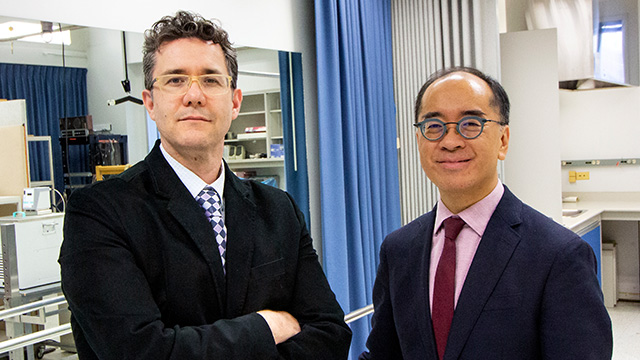
Adalberto Loyola-Sanchez (l) and Chester Ho are developing a new model of care for patients with spinal cord injury. The project was one of two recently awarded funding from CIHR under the new Transitions in Care program.
Led by Chester Ho, University of Alberta Spinal Cord Research Chair, director of the Division of Physical Medicine & Rehabilitation in the Department of Medicine and member of the Neuroscience and Mental Health Institute, and assistant professor Adalberto Loyola-Sanchez, the CONCENTRIC project will explore a model of transitional care that works like a "hub and spokes system," similar to Alberta's system of major and minor airports. Edmonton and Calgary will act as primary "hubs," providing spinal cord injury specialty services and information to patients on managing their conditions. Health-care providers in communities outside of Edmonton and Calgary will be the "spokes," providing ongoing care and support for patients in the community.
Currently, Lethbridge and Slave Lake are participating in the pilot project, but the team is hoping to ultimately expand the number of spokes to cover the entire province. The goal is to build capacity in spoke communities and constant communication between the hubs and spokes so that patients with spinal cord injuries have a more consistent level of care, and fewer complications later in life.
"Both the data and patients have been telling us that we could be doing a better job of transitioning patients with spinal cord injuries back into their communities," Ho said. "Patients have told us they felt they received excellent care in Edmonton and Calgary, but when they got back to their community, they 'fell off a cliff.'"
Ho says one of the issues with spinal cord injury is that patients often don't realize that the injury and the health system, are something they will live with for the rest of their lives. They visit emergency rooms and are readmitted to the hospital far more often than other groups, especially in rural communities. At the same time, health-care providers in smaller communities who don't frequently deal with spinal cord injuries often don't have the experience or resources to manage the chronic issues that arise as a consequence of the condition.
The approach Ho and Loyola-Sanchez are exploring is meant to address those issues by building networks across multiple areas to approach patients from a medical as well as social and psychological perspectives.
"Transitions in care, for us, is not just moving people from acute care to rehabilitation services and then to the community. It's not a linear progression," Loyola-Sanchez said. "Our definition is more holistic, integrating the areas of health, psychological and social issues caused by the injury, with the multiple levels of care that patients will need, including care in their communities."
"If we connect them in an efficient way, we can exchange knowledge and learn from each other so that patients get the support they need wherever they are and live the lives they want to live."
Indigenous focus
One area the team is putting additional focus on is Indigenous peoples' health outcomes, something Loyola-Sanchez is particularly passionate about. After working with Indigenous communities in Mexico and different parts of Canada, Loyola-Sanchez found that Indigenous peoples typically had the worst health outcomes as a result of chronic illness. One of the pieces of data the team is hoping to gather is if the same is true of Alberta's Indigenous people and spinal cord injury.
"Indigenous people typically have poorer access and poorer services than other people, even in the same community," he said. "So we have a mainstream strategy and a specific strategy for Indigenous communities to answer that question in a way that respects their autonomy and accounts for cultural differences."
New CIHR Grant Funding
Transitions in care
According to CIHR, transitions in care are when transfer of responsibility and accountability for some or all aspects of patient care occurs among providers, institutions, and/or sectors (e.g., federal and provincial jurisdictions, or education, judicial and other environments). Canadian health systems are organized in a way that requires individuals to receive health services from a number of care providers, in a number of locations, leading to multiple transitions in care over time. This is especially true for individuals experiencing changes to their health status, as they grow older, experience a change in care need and/or have a change in their location of care.
The CONCENTRIC project was recently awarded $700,000 from the Canadian Institutes of Health Research (CIHR) under a new program called Transitions In Care. Launched in 2018, the program is designed to support research and projects that look to improve transitions in care in a health-care activity, or across a health-care system. The funding was awarded in the Team Grants category, which supports interdisciplinary or multidisciplinary research teams working on putting improved transitions in care approaches into practice.
The project is also receiving support from the University of Alberta, Alberta Health Services, the Alberta Paraplegic Foundation, the University of Calgary and the Friends of the Glenrose.